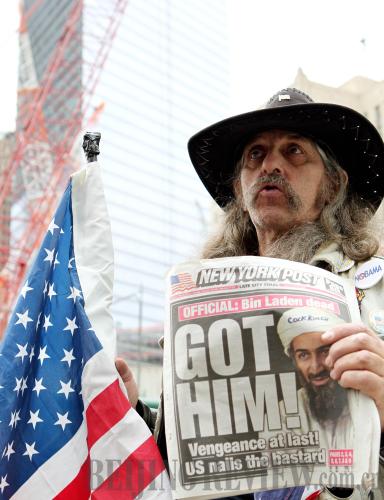|
 |
|
CELEBRATIONS: A man holds a newspaper with reports on Osama bin Laden's death during a rally at the World Trade Center site in New York on May 2 (WU JINGDAN) |
Almost 10 years after the September 11 terrorist attacks, the United States finally killed Osama Bin Laden, who was considered the main culprit of the 2001 attacks on New York and Washington, D.C. that killed more than 3,000 people in the United States. But bin Laden's death does not mean the end of the U.S.-led war on terror.
U.S. President Barack Obama announced on May 1 a U.S. military operation had killed Al Qaeda leader Bin Laden, who was hiding in a compound in the town of Abbottabad near the Pakistani capital of Islamabad. Bin Laden, born in Saudi Arabia in 1957, was widely seen as the kingpin of global terrorism and responsible for a string of anti-U.S. attacks.
In his speech, Obama described the death of the terrorist leader as the "most significant achievement" to date in U.S. efforts to defeat Al Qaeda. He stressed he decided to make the killing of Bin Laden the top priority in the war against Al Qaeda after taking office in 2009.
The Chinese Foreign Ministry said it believed this was "a milestone and a positive development for the international anti-terrorism efforts." It said terrorism is the common enemy of the international community, and China is also a victim of terrorism. China called on the world to strengthen cooperation on fighting terrorism. At the same time, it stressed addressing the root causes of terrorism is a bigger task.
Tang Zhichao, Deputy Director of the Institute of West Asian and African Studies of the China Institutes of Contemporary International Relations, said Bin Laden's death was the "biggest victory" in the U.S. antiterror war since the September 11 attacks. In addition to the war on terror, former U.S. President George W. Bush launched two additional wars in Iraq and Afghanistan, but little was achieved in the wars during his tenure. Now Obama might be able to conclude all three wars, said Tang.
He explained Bin Laden's death would accelerate the transition of Afghanistan, hastening a U.S. withdrawal from the country. It was not only a significant victory for Obama and his security team, but also a boon for his coming re-election campaign. For Obama's re-election prospects, Bin Laden's death would be even more helpful than the end of U.S. combat operations in Iraq in 2010, Tang said.
But, he said, killing Bin Laden would not drastically relieve the United States' antiterror pressure, because Al Qaeda's strength and leadership would not be weakened after Bin Laden's death. In recent years, the organization has been decentralized, and its leadership has been divided and transferred to different regions. Besides, Ayman al-Zawahiri has long replaced Bin Laden as the de-facto leader of the organization, while the latter remained mainly as a spiritual leader.
Tang predicted Al Qaeda might shift its focus westward to the Middle East after Bin Laden's death, and current regional turmoil offers great opportunities for the organization. The three Al Qaeda divisions in the Middle East—Al Qaeda in the Islamic Maghreb, the Yemen-based Al Qaeda in the Arabian Peninsula and Al Qaeda in Iraq—will play bigger roles than the divisions in Pakistan and Afghanistan.
As Al Qaeda vowed revenge, the United States faces a mounting threat. Shortly after Obama's speech, amid fears of retaliatory anti-U.S. violence, the U.S. State Department issued a global travel alert to U.S. citizens, and put all the U.S. embassies on alert. Tang said Western Europe and pro-U.S. regimes such as Pakistan, Saudi Arabia and Yemen also faced severe risks.
He said the relationship between the United States and the Islamic world would enter a new phase after Bin Laden's death. Since Bin Laden was considered an anti-West hero among Muslims, his killing could make it more difficult for the United States to cope with the ongoing turmoil in the Middle East. Tang said, Bin Laden's death might prompt Obama to take further steps to ameliorate the United States' relationship with the Islamic world in the long run.
Li Daguang, a professor with China's National Defense University, said terrorism has deep social, political, economic and cultural roots, so it is essential to get rid of these roots before terrorist threats are eliminated. Li said the antiterror war should not be carried out in a way of "curbing violence with violence." After Obama took office, he dispatched more troops to Afghanistan, but the policy didn't bring safety to the United States. Unlimited military actions launched in the name of counterterrorism could cause unpredictable consequences for global security. | 